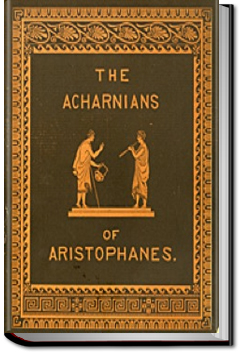Loaded with cryptic, nearly indecipherable inside jokes and double entendres, this early comedy of Aristophanes has a simple, anti-war premise that resounds down the centuries. On flimsy pretexts, greedy politicians have embroiled the nation of Athens in war after war after war. Dicæopolis is Everyman, an ordinary, plain-speaking citizen fed up with the bumbling, belligerence, and insincerity of the professional leaders. He decides on a whim to make a separate peace with Sparta all by himself, returning with a treaty good for thirty years. Envious of the good deal he has made and of the profit he sees from it, other Athenians try to buy packets of his peace from him, with no success. Puffed up with his own cleverness, Dicæopolis spends the final scenes of the play ridiculing the muscle-brained neanderthal General Lamachus for faux patriotism and comic chest-beating heroism.
of Sitalces.(1)
f(1) King of Thrace.
THEORUS
I am here.
DICAEOPOLIS
Another humbug!
THEORUS
We should not have remained long in Thrace...
DICAEOPOLIS
Forsooth, no, if you had not been well paid.
THEORUS
...if the country had not been covered with snow; the rivers were
ice-bound at the time that Theognis(1) brought out his tragedy here;
during the whole of that time I was holding my own with
Sitalces, cup in hand; and, in truth, he adored you to such a degree,
that he wrote on the walls, "How beautiful are the Athenians!" His
son, to whom we gave the freedom of the city, burned with desire to
come here and eat chitterlings at the feast of the Apaturia;(2) he prayed
his father to come to the aid of his new country and Sitalces swore on
his goblet that he would succour us with such a host that the Athenians
would exclaim, "What a cloud of grasshoppers!"
f(1) The tragic poet.
f(2) A feast lasting three days and celebrated during the month Pyanepsion
(November). The Greek word contains the suggestion of fraud.
DICAEOPOLIS
May I die if I believe a word of what you tell us! Excepting the
grasshoppers, there is not a grain of truth in it all!
THEORUS
And he has sent you the most warlike soldiers of all Thrace.
DICAEOPOLIS
Now we shall begin to see clearly.
HERALD
Come hither, Thracians, whom Theorus brought.
DICAEOPOLIS
What plague have we here?
THEORUS
'Tis the host of the Odomanti.(1)
f(1) A Thracian tribe from the right bank of the Strymon.
DICAEOPOLIS
Of the Odomanti? Tell me what it means. Who has mutilated them
like this?
THEORUS
If they are given a wage of two drachmae, they will put all
Boeotia(1) to fire and sword.
f(1) The Boeotians were the allies of Sparta.
DICAEOPOLIS
Two drachmae to those circumcised hounds! Groan aloud, ye people
of rowers, bulwark of Athens! Ah! great gods! I am undone; these
Odomanti are robbing me of



the dubious folks of ill intention,
will make all shorts of faulty claims
but truth prevails and brakes all chains:
Democracy and Peace match well,
without them, everything goes to Hell!
Avoid the demagogues, they always lie
especially the ones who prophesy!
Dic